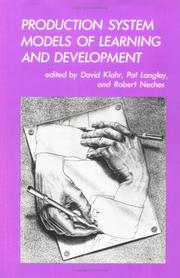| Listing 1 - 7 of 7 |
Sort by
|
Dissertation
Abstract | Keywords | Export | Availability | Bookmark
 Loading...
Loading...Choose an application
- Reference Manager
- EndNote
- RefWorks (Direct export to RefWorks)
Cytological Techniques --- Models, Theoretical --- Pattern Recognition, Automated --- Statistics as Topic
Dissertation
Year: 1987 Publisher: S.l. s.n.
Abstract | Keywords | Export | Availability | Bookmark
 Loading...
Loading...Choose an application
- Reference Manager
- EndNote
- RefWorks (Direct export to RefWorks)
Delivery of Health Care --- Nursing Care --- Philosophy, Nursing --- Models, Theoretical --- Patient Care Planning --- organization & administration
Periodical
Abstract | Keywords | Export | Availability | Bookmark
 Loading...
Loading...Choose an application
- Reference Manager
- EndNote
- RefWorks (Direct export to RefWorks)
Cellular automata --- fizika --- periodika --- Automates cellulaires. --- 54.30 technical structure of computer systems: general. --- Cellular automata. --- Models, Theoretical. --- Systems Theory. --- NPA --- ELTE --- #TS:WDEP --- Mathematical Sciences --- Applied Mathematics
Periodical
Abstract | Keywords | Export | Availability | Bookmark
 Loading...
Loading...Choose an application
- Reference Manager
- EndNote
- RefWorks (Direct export to RefWorks)
Cellular automata --- Cellular automata. --- Mathematical models. --- System theory. --- Models, Theoretical --- Systems Theory --- fizika --- periodika --- Automates cellulaires. --- Automates cellulaires --- Modèles mathématiques. --- Théorie des systèmes. --- NPA --- ELTE
Periodical
Abstract | Keywords | Export | Availability | Bookmark
 Loading...
Loading...Choose an application
- Reference Manager
- EndNote
- RefWorks (Direct export to RefWorks)
Cellular automata --- Cellular automata. --- Mathematical models. --- System theory. --- Models, Theoretical --- Systems Theory --- fizika --- periodika --- Automates cellulaires. --- Automates cellulaires --- Modèles mathématiques. --- Théorie des systèmes. --- mathematical models. --- 54.30 technical structure of computer systems: general. --- NPA --- ELTE
Periodical
Abstract | Keywords | Export | Availability | Bookmark
 Loading...
Loading...Choose an application
- Reference Manager
- EndNote
- RefWorks (Direct export to RefWorks)
Cellular automata --- Cellular automata. --- Mathematical models. --- System theory. --- Models, Theoretical --- Systems Theory --- fizika --- periodika --- Automates cellulaires. --- Automates cellulaires --- Modèles mathématiques. --- Théorie des systèmes. --- mathematical models. --- 54.30 technical structure of computer systems: general. --- NPA --- ELTE

ISBN: 0262111144 0262315963 9780262111140 9780262315968 Year: 1987 Publisher: London : M.I.T. Press,
Abstract | Keywords | Export | Availability | Bookmark
 Loading...
Loading...Choose an application
- Reference Manager
- EndNote
- RefWorks (Direct export to RefWorks)
Cognitive psychologists have found the production systems class of computer simulation models to be one of the most direct ways to cast complex theories of human intelligence. There have been many scattered studies on production systems since they were first proposed as computational models of human problem-solving behavior by Allen Newell some twenty years ago, but this is the first book to focus exclusively on these important models of human cognition, collecting and giving many of the best examples of current research. In the first chapter, Robert Neches, Pat Langley, and David Klahr provide an overview of the fundamental issues involved in using production systems as a medium for theorizing about cognitive processes, emphasizing their theoretical power. The remaining chapters take up learning by doing and learning by understanding, discrimination learning, learning through incremental refinement, learning by chunking, procedural earning, and learning by composition. A model of cognitive development called BAIRN is described, and a final chapter reviews John Anderson's ACT theory and discusses how it can be used in intelligent tutoring systems, including one that teaches LISP programming skills. In addition to the editors, the contributors are Yuichiro Anzai (Hokkaido University, Japan), Paul Rosenbloom (Stanford) and Allen Newell (Carnegie-Mellon), Stellan Ohlsson (University of Pittsburgh), Clayton Lewis (University of Colorado, Boulder), Iain Wallace and Kevin Bluff (Deakon University, Australia), and John Anderson (Carnegie-Mellon). David Klahr is Professor and Head of the Department of Psychology at Carnegie-Mellon University. Pat Langley is Associate Professor, Department of Information and Computer Science, University of California, Irvine, and Robert Neches is Research Computer Scientist at University of Southern California Information Sciences Institute. Production System Models of Learning and Development is included in the series Computational Models of Cognition and Perception, edited by Jerome A. Feldman, Patrick J. Hayes, and David E. Rumelhart. A Bradford Book.
Cognition. --- Learning. --- Models, Theoretical. --- Cognition --- -Human information processing --- Learning, Psychology of --- 681.3*I20 --- 681.3*I26 --- Computer simulation --- Artificial intelligence (AI) in general; cognitive simulation; philosophical foundations --- Learning: analogies; concept learning; induction; knowledge acquisition; language acquisition; parameter learning (Artificial intelligence)--See also {681.3*K32} --- Human information processing. --- Learning, Psychology of. --- Models --- Computer simulation. --- theoretical. --- 681.3*I26 Learning: analogies; concept learning; induction; knowledge acquisition; language acquisition; parameter learning (Artificial intelligence)--See also {681.3*K32} --- 681.3*I20 Artificial intelligence (AI) in general; cognitive simulation; philosophical foundations --- Learning --- Psychology of learning --- Educational psychology --- Comprehension --- Learning ability --- Information processing, Human --- Bionics --- Information theory in psychology --- Perception --- Psychology --- Memory Training --- Phenomenography --- Training, Memory --- Memory Consolidation --- Education --- Cognitive Function --- Cognitions --- Cognitive Functions --- Function, Cognitive --- Functions, Cognitive --- Psychological aspects --- Cognitive psychology --- Developmental psychology --- Human information processing --- Models, Theoretical --- Experimental Model --- Experimental Models --- Mathematical Model --- Model, Experimental --- Models (Theoretical) --- Models, Experimental --- Models, Theoretic --- Theoretical Study --- Mathematical Models --- Model (Theoretical) --- Model, Mathematical --- Model, Theoretical --- Models, Mathematical --- Studies, Theoretical --- Study, Theoretical --- Theoretical Model --- Theoretical Models --- Theoretical Studies --- Computer Simulation --- Systems Theory --- Learning process --- Artificial intelligence --- Cognition - Computer simulation --- Data processing. --- Mathematical models. --- Man --- Mental processes --- Mathematical models --- Applications of computer systems --- COGNITIVE SCIENCES/General --- Learning, psychology of
| Listing 1 - 7 of 7 |
Sort by
|

 Search
Search Feedback
Feedback About
About Help
Help News
News